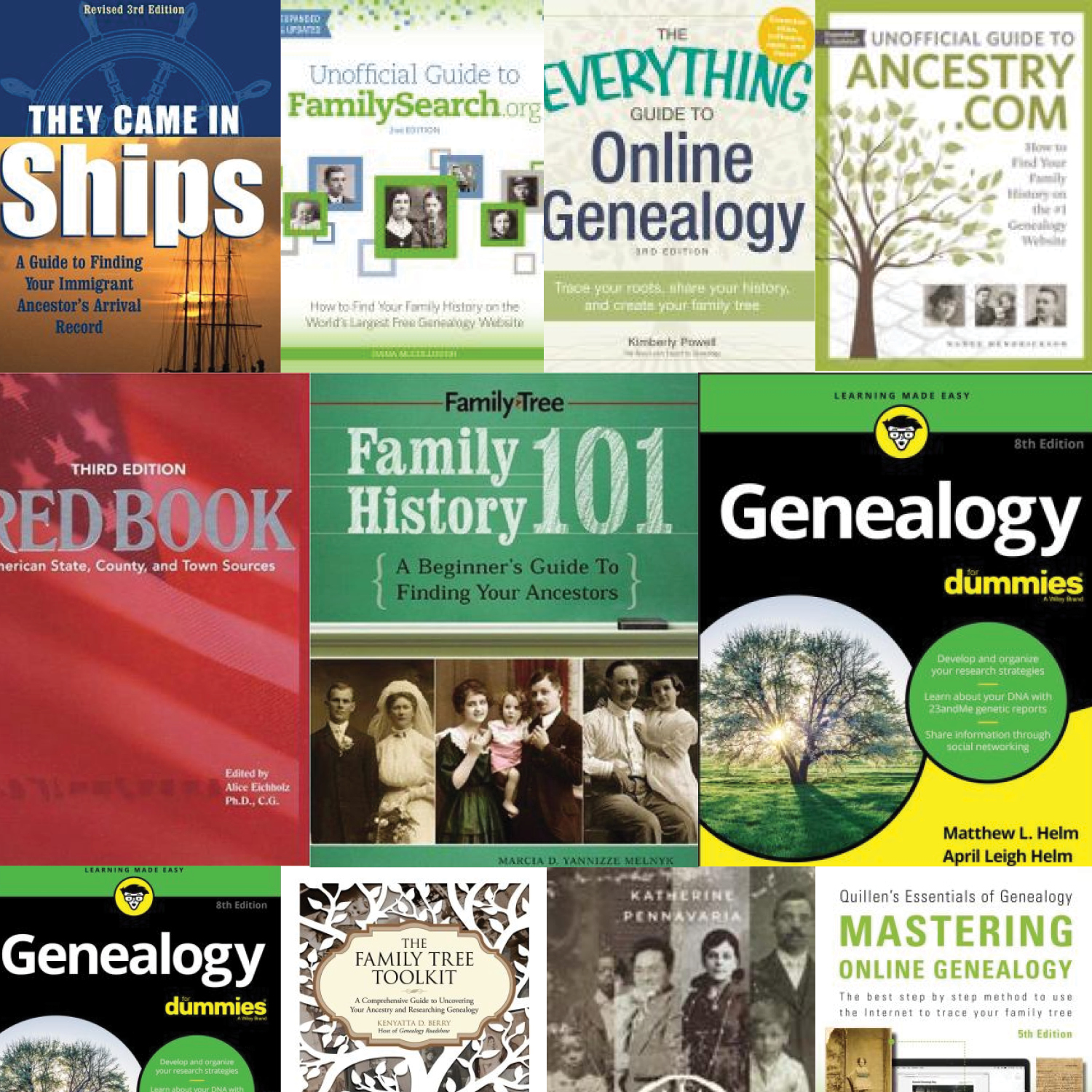Time for family history
 Processing Request
Processing Request
by Debbie Rosenberg
It’s February and still cold outside. I should be doing chores, but it feels like the time is right to do some family history work instead. People often ask how to get started in genealogy, and I’m not an expert, but I can give some advice. Start with yourself and what you know, don’t jump to your grandparents’ parents. During this unprecedented period of working from home and social distancing we are lucky to have some resources available to you through your home computer and many resources available to check out through curbside pickup.
We have several good books for beginning genealogists.
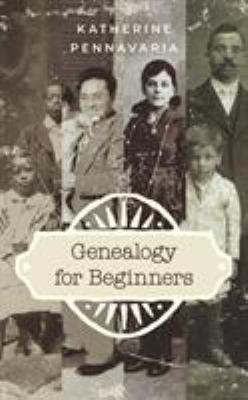 Genealogy for beginners by Katherine Pennavaria is our newest book for beginners. This book covers everything you need to get started from step by step beginning quality research, to getting organized, comparing subscription services and even DNA testing.
Genealogy for beginners by Katherine Pennavaria is our newest book for beginners. This book covers everything you need to get started from step by step beginning quality research, to getting organized, comparing subscription services and even DNA testing.
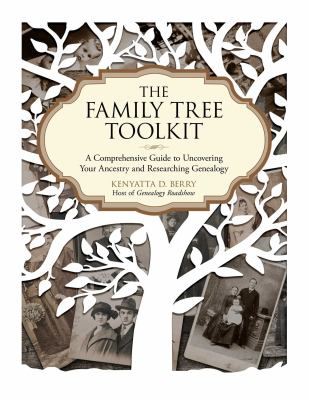 The family tree toolkit : a comprehensive guide to uncovering your ancestry and researching genealogy by Kenyatta Berry is an all purpose, easy to follow guide for the beginner genealogist. It guides you on how and where to begin, from what records are online to what records are in repositories.
The family tree toolkit : a comprehensive guide to uncovering your ancestry and researching genealogy by Kenyatta Berry is an all purpose, easy to follow guide for the beginner genealogist. It guides you on how and where to begin, from what records are online to what records are in repositories.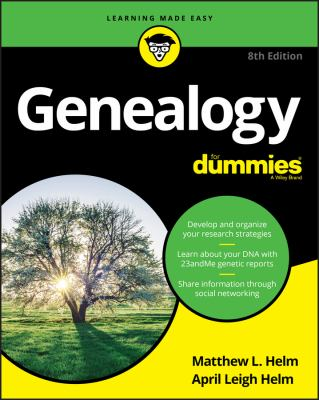 Genealogy by Matthew and April Helm is from the "for dummies" series by Wiley. These books are well organized and indexed and designed for beginners.
Genealogy by Matthew and April Helm is from the "for dummies" series by Wiley. These books are well organized and indexed and designed for beginners.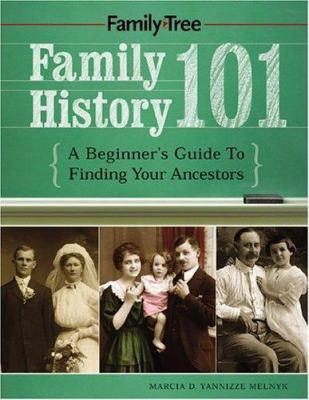 Family history 101 : a beginner's guide to finding your ancestors by Maria Melnyk has been around longer and is also a quick read for those just getting started in researching their family history.
Family history 101 : a beginner's guide to finding your ancestors by Maria Melnyk has been around longer and is also a quick read for those just getting started in researching their family history.
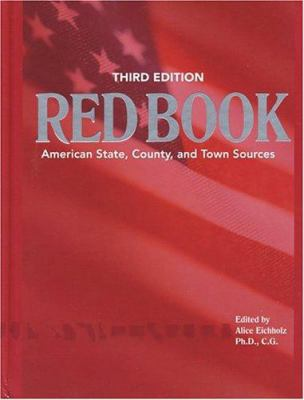 Red book : American state, county, and town sources Ancestry's red book by Alice Eicholz is a book in our reference collection so although you can't take it home, you can search it for information on each state.
Red book : American state, county, and town sources Ancestry's red book by Alice Eicholz is a book in our reference collection so although you can't take it home, you can search it for information on each state.  Mastering online genealogy : Volume I of Quillen's essentials of genealogy by Daniel Quillen This revised fifth edition of Mastering Online Genealogy covers the use of computers and the internet to successfully do your own genealogy research. The internet is a tool and not the complete repository of all genealogy.
Mastering online genealogy : Volume I of Quillen's essentials of genealogy by Daniel Quillen This revised fifth edition of Mastering Online Genealogy covers the use of computers and the internet to successfully do your own genealogy research. The internet is a tool and not the complete repository of all genealogy. The everything guide to online genealogy : trace your roots, share your history, and create your family tree by Kimberly Powell Genealogy expert Kimberly Powell has been writing about genealogy since 2000 and this book helps you search various websites effectively, decipher census data and other online records, and choose the best way to share what you find with family members.
The everything guide to online genealogy : trace your roots, share your history, and create your family tree by Kimberly Powell Genealogy expert Kimberly Powell has been writing about genealogy since 2000 and this book helps you search various websites effectively, decipher census data and other online records, and choose the best way to share what you find with family members.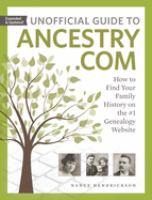 Unofficial guide to ancestry.com : how to find your family history on the #1 genealogy website by Nancy Hendrickson Ancestry.com is the largest genealogy website with billions of records and this book will help guide you so that you can find information that pertains to your family. Be sure to use our website to get to Ancestry.com and have free access from home with your library card and pin numbers during the pandemic. Usually this database is only available within the library. Start at our website www.fdlpl.org and click on the box Local History & Genealogy. The option "Genealogy" on the left side of the page will take you to databases which you will find helpful such as Ancestry, FamilySearch, Find a Grave, Cindi's List, and The Family History Guide
Unofficial guide to ancestry.com : how to find your family history on the #1 genealogy website by Nancy Hendrickson Ancestry.com is the largest genealogy website with billions of records and this book will help guide you so that you can find information that pertains to your family. Be sure to use our website to get to Ancestry.com and have free access from home with your library card and pin numbers during the pandemic. Usually this database is only available within the library. Start at our website www.fdlpl.org and click on the box Local History & Genealogy. The option "Genealogy" on the left side of the page will take you to databases which you will find helpful such as Ancestry, FamilySearch, Find a Grave, Cindi's List, and The Family History Guide 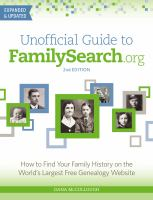 Unofficial guide to FamilySearch.org : how to find your family history on the world's largest free genealogy website by Dana McCullough FamilySearch is the largest free genealogy website and everyone needs some direction to make the best use of all of those records.
Unofficial guide to FamilySearch.org : how to find your family history on the world's largest free genealogy website by Dana McCullough FamilySearch is the largest free genealogy website and everyone needs some direction to make the best use of all of those records.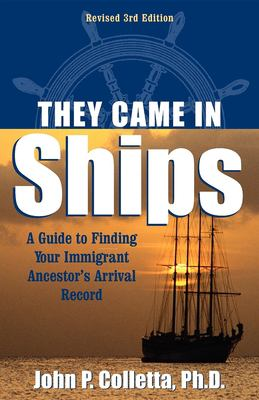 They came in ships : a guide to finding your immigrant ancestor's arrival record by John Colletta to find out how to locate passenger lists for ships. In our Seefeld Local History Room we have several Passenger and Immigration Indexes which may help you find the ship your ancestors travelled on and who else was aboard. We have indexes geared toward immigrants traveling from Germany, Ireland, and other countries.
They came in ships : a guide to finding your immigrant ancestor's arrival record by John Colletta to find out how to locate passenger lists for ships. In our Seefeld Local History Room we have several Passenger and Immigration Indexes which may help you find the ship your ancestors travelled on and who else was aboard. We have indexes geared toward immigrants traveling from Germany, Ireland, and other countries.
Debbie Rosenberg has worked in the FDL Public Library Reference department for 30 years.

